
‘Time of Transformation’ by Youssef Nabil
Apr 14, 2013 Exhibition

This new body of work explores notions of transition and change as Nabil reflects upon an Egypt that is rapidly transforming and acquiring new ideals that he is unfamiliar with. An alien disconnect that has much more to do with the changing landscape than his physical absence, Nabil presents ephemeral imagery that he feels will soon be lost forever.
The Veiled Women series features women from the fields of art, music and cinema, all adorning the Mediterranean veil. In these portraits, Nabil ruminates about meanings associated with the veil now and how it was once worn in the Mediterranean cultures. By presenting the idea of the veil he loved, Nabil provides an allegory that is in sharp contrast to its connotation in the present day. The portraits echo a loss of innocence and the assimilation of new ideals that delineate between sex and religion.
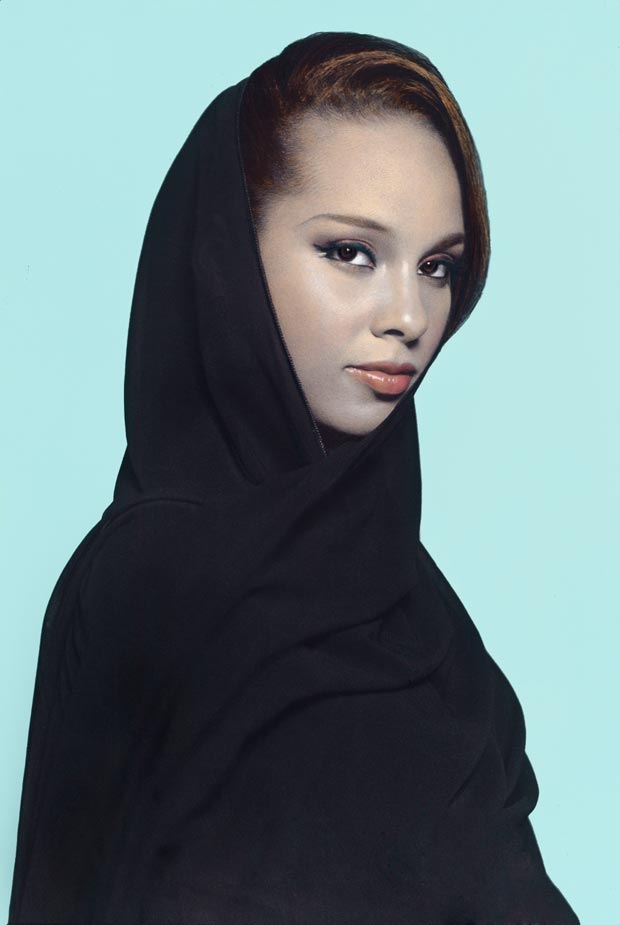 Youssef Nabil, Alicia Keys, New York, 2010, Hand colored gelatin silver print, 50x75 cm / Courtesy of the Artist and The Third Line
Youssef Nabil, Alicia Keys, New York, 2010, Hand colored gelatin silver print, 50x75 cm / Courtesy of the Artist and The Third Line
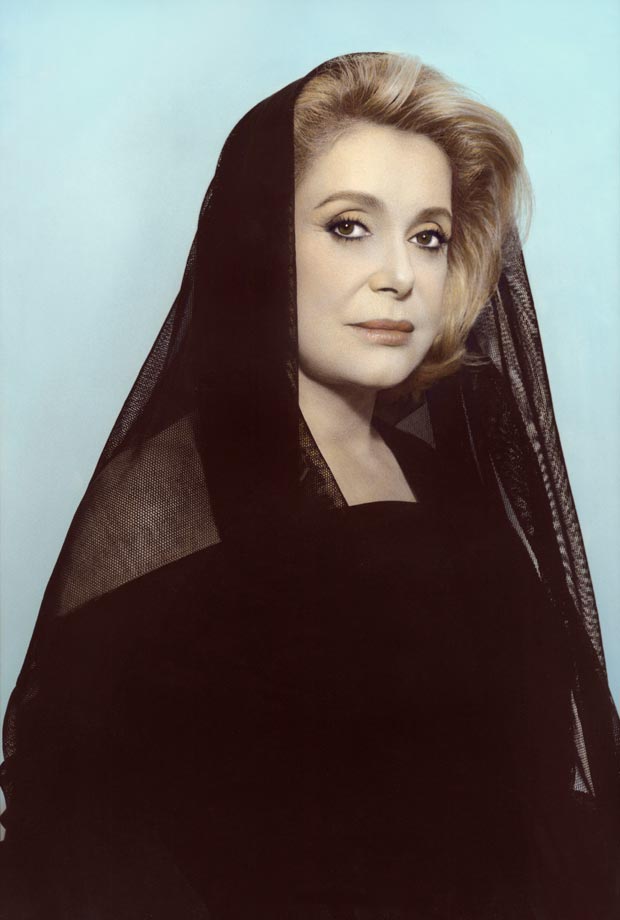 Youssef Nabil, Catherine Deneuve, Paris, 2010, Hand colored gelatin silver print, 50x75 cm / Courtesy of the Artist and The Third Line
Youssef Nabil, Catherine Deneuve, Paris, 2010, Hand colored gelatin silver print, 50x75 cm / Courtesy of the Artist and The Third Line
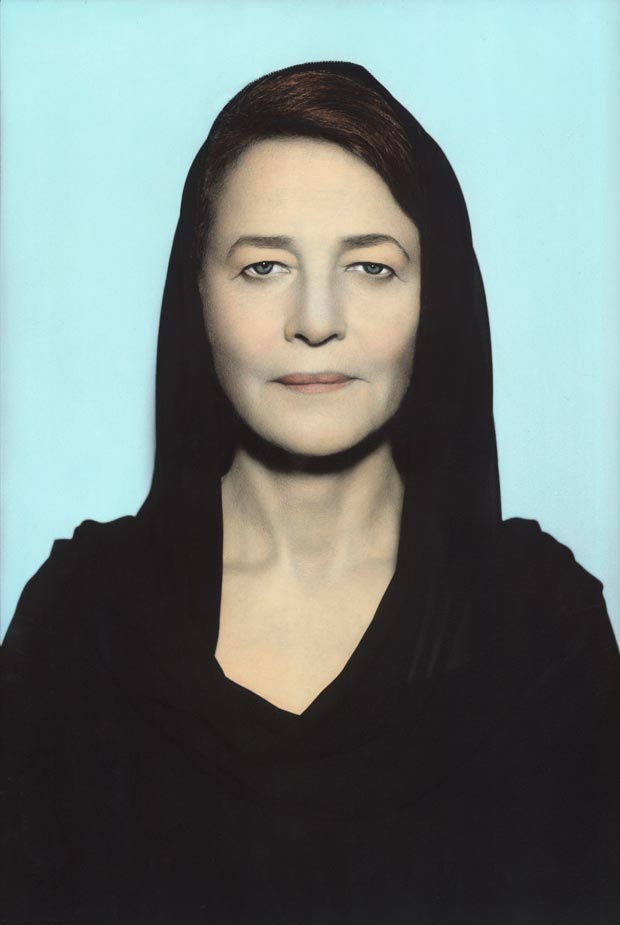 Youssef Nabil, Charlotte Rampling, Paris, 2011, Hand colored gelatin silver print, 50x75 cm / Courtesy of the Artist and The Third Line
Youssef Nabil, Charlotte Rampling, Paris, 2011, Hand colored gelatin silver print, 50x75 cm / Courtesy of the Artist and The Third Line
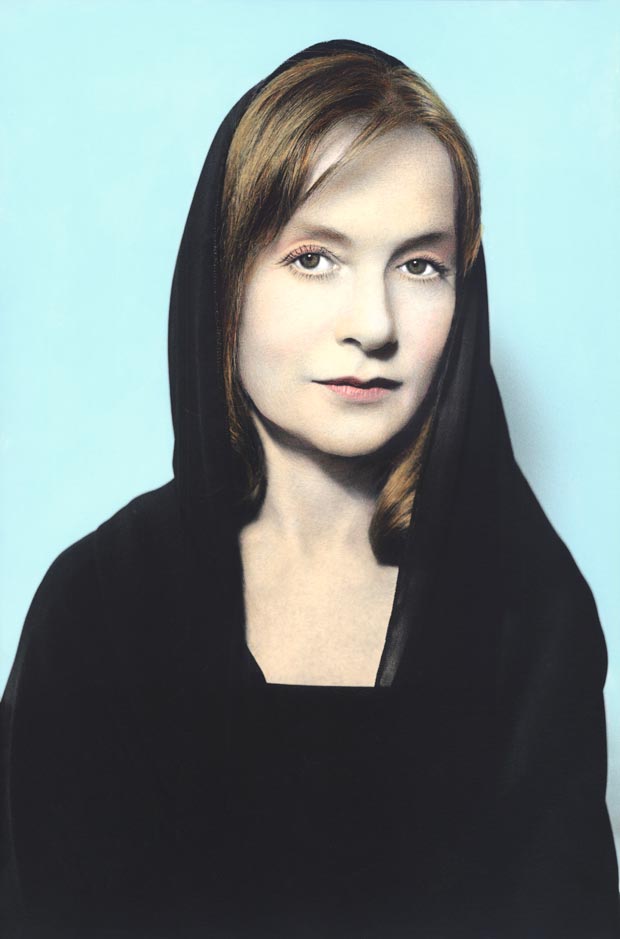 Youssef Nabil, Isabelle Huppert, Paris, 2012, Hand colored gelatin silver print, 50x75 cm / Courtesy of the Artist and The Third Line
Youssef Nabil, Isabelle Huppert, Paris, 2012, Hand colored gelatin silver print, 50x75 cm / Courtesy of the Artist and The Third Line
In The Last Dance series, change is explored through the medium of dance. Multiple images of belly dancers caught in whirling movements make up a kaleidoscopic visual frenzy. While the images are sensual in nature, it is the association of the ‘sexual’ with this art form that is now threatening its survival in Egypt. The slow disappearance of these belly dancers is significant of a new cultural identity that is following political shifts in the Egyptian mindsets.
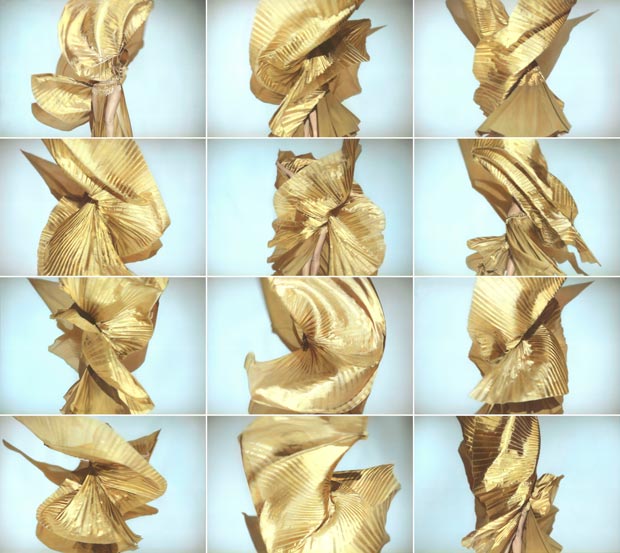 Youssef Nabil, The Last Dance (I), Denver, 2012, Hand colored gelatin silver print, 26 x 39 cm each (12 prints) / Courtesy of the Artist and The Third Line
Youssef Nabil, The Last Dance (I), Denver, 2012, Hand colored gelatin silver print, 26 x 39 cm each (12 prints) / Courtesy of the Artist and The Third Line
The Transformation panels look at the subtle change in the subject through seven stages. Almost staged as dramatic renditions of reactionary expressions, the work addresses how the artist is personally grappling with, and responding to, the transformations that are taking place within him.
 Youssef Nabil, Transformation (I) Marina Abramovic, New York, 2011, Hand colored gelatin silver print, 26x39cm each (7-prints) / Courtesy of the Artist and The Third Line
Youssef Nabil, Transformation (I) Marina Abramovic, New York, 2011, Hand colored gelatin silver print, 26x39cm each (7-prints) / Courtesy of the Artist and The Third Line
Youssef Nabil was born in Egypt in 1972, and lives and works in New York. Three monographs have been published on Nabil's work – Sleep in My Arms (Autograph ABP and Michael Stevenson, 2007), I won't let you die (Hatje Cantz, 2008) and most recently, a self-titled monograph Youssef Nabilpublished by Flammarion (2013). In 2010, the artist known for his work combining photography and painting presented his first film You Never Left, an 8-minute piece with the actors Fanny Ardant and Tahar Rahim.
Nabil's work has been presented in numerous solo and group exhibitions at venues including the British Museum, London; Centro de la Imagen, Mexico City; North Carolina Museum of Art, North Carolina; BALTIC Centre for Contemporary Art, Newcastle; Michael Stevenson Gallery, Cape Town; Galeria Leme, São Paulo; Townhouse Gallery, Cairo; FotoFest Houston, Texas; Centre de Cultura Contemporánea de Barcelona; Institut du Monde Arabe, Paris; Kunstmuseum, Bonn; The Third Line, Dubai; Centro Andaluz de Arte Contemporáneo, Sevilla; and Aperture Foundation, New York.
He is part of various international collections including La Maison Europeenne de La Photographie, Paris; a joint collection between The British Museum and The Victoria & Albert Museum; Centro de la Imagen, Mexico City; Mathaf Arab Museum of Modern Art, Doha; and most recently the Guggenheim Museum, Abu Dhabi.
The Third Line is a Dubai based art gallery that represents contemporary Middle Eastern artists locally, regionally and internationally. The Third Line also hosts non-profit, alternative programs to increase interest and dialogue in the region. Represented artists include: Abbas Akhavan, Ala Ebtekar, Amir H. Fallah, Arwa Abouon, Babak Golkar, Ebtisam Abdulaziz, Farhad Moshiri, Fouad Elkoury, Golnaz Fathi, Hassan Hajjaj, Hayv Kahraman, Huda Lutfi, Joana Hadjithomas & Khalil Joreige, Laleh Khorramian, Lamya Gargash, Monir Shahroudy Farmanfarmaian, Pouran Jinchi, Rana Begum, Sahand Hesamiyan, Sherin Guirguis, Shirin Aliabadi, Slavs and Tatars, Sophia Al-Maria, Tarek Al-Ghoussein and Youssef Nabil.
Comments
Add a comment